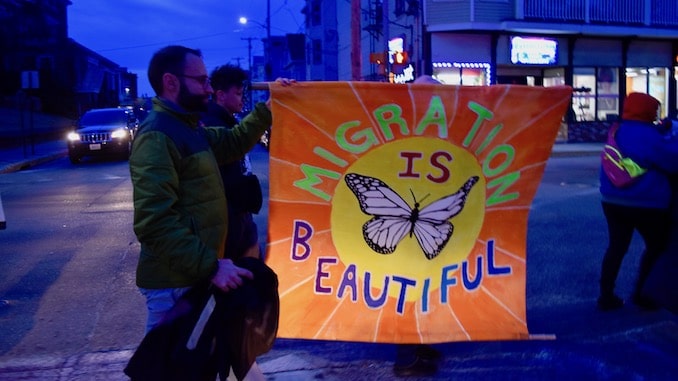Rhode Island Immigrant Coalition decries new public charge rule – will work to ensure immigrants know their rights to benefits
The Rhode Island Immigrant Coalition strongly opposes the changes to the public charge rules which were published in final form on Monday. The rule threatens the health of thousands of Rhode Island families, weaponizing health and human services programs against lawfully present immigrants and their families, including United States born children. The Coalition and many Rhode Island organizations submitted comments
August 14, 2019, 3:18 pm
By Rhode Island Immigrant Coalition
The Rhode Island Immigrant Coalition strongly opposes the changes to the public charge rules which were published in final form on Monday. The rule threatens the health of thousands of Rhode Island families, weaponizing health and human services programs against lawfully present immigrants and their families, including United States born children. The Coalition and many Rhode Island organizations submitted comments against the regulation when it was proposed last fall. Overall more than 266,000 public comments, overwhelmingly in opposition to the rule, were received.
“This rule is just one of a number of the Administration’s attacks on immigrants,” said Karina Valencia, Staff Attorney of the Rhode Island Immigrant Coalition. “We will continue to fight back against this anti-children, anti-family agenda, including family separation at the border and rules blocking access to health care, food and homes.”
The final regulation puts applications for lawful permanent residence (green card) at risk if an immigrant has used Medicaid, the Supplemental Nutrition Assistance Program (SNAP) or Section 8 rent vouchers. Under prior rules, only receipt of cash welfare or Medicaid long term care were considered as part of the green card application process. Citizenship applications are not subject to “public charge” regulation and refugees, asylees, and other immigrant statuses are also exempt. This is not changed under the new rule.
“The proposed rule had a chilling effect on families accessing the benefits they need to meet basic needs,” said Linda Katz, Policy Director at the Economic Progress Institute. “One way to fight back against this horrible rule is to work together to ensure families know the benefits they can get without jeopardizing their immigration status. For example, receipt of Medicaid by an immigrant under age 21 and by a pregnant woman during pregnancy and 60 days post-partum will not impact getting a green card.”
The City and County of San Francisco and the County of Santa Clara filed a lawsuit against the rule on August 13 and other organizations and states attorney general are also preparing litigation. The lawsuits seek to stop the rule from going into effect. In addition, Congress can block the regulation’s implementation.
“We are one community – our children go to school together, we work side-by-side with people who have come to this country for a better life, our health is intertwined,” said Arely Diaz of Alianza para Movilizar Nuestra Resistencia (AMOR). “We remain united in fighting back against this Administration’s continued attacks against our immigrant community.”






